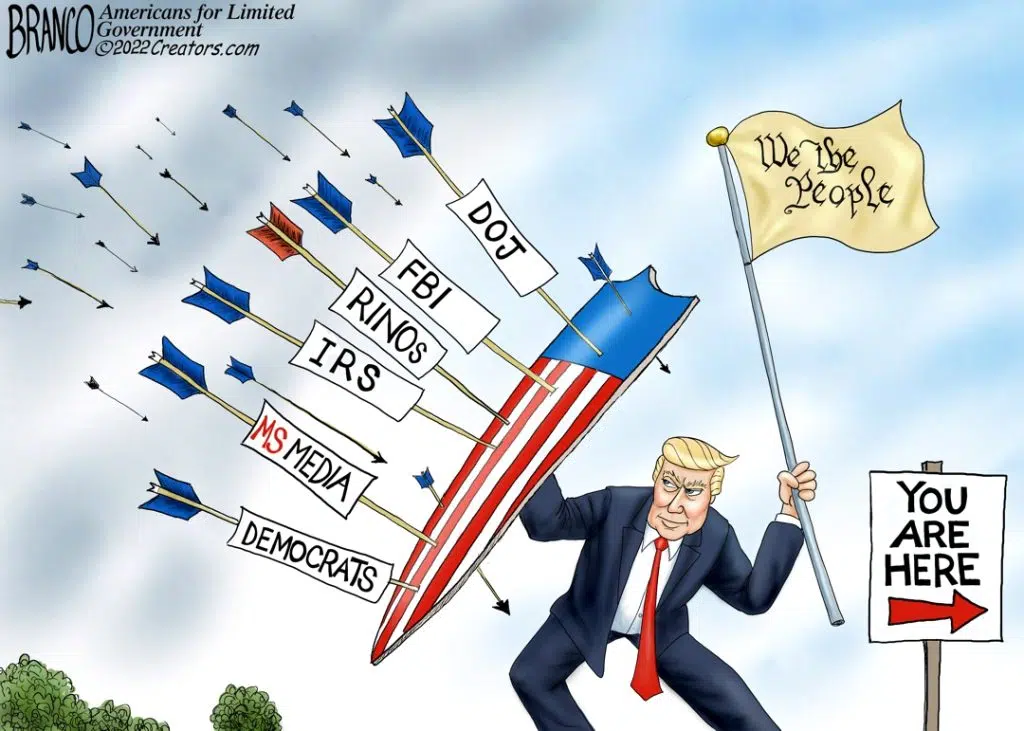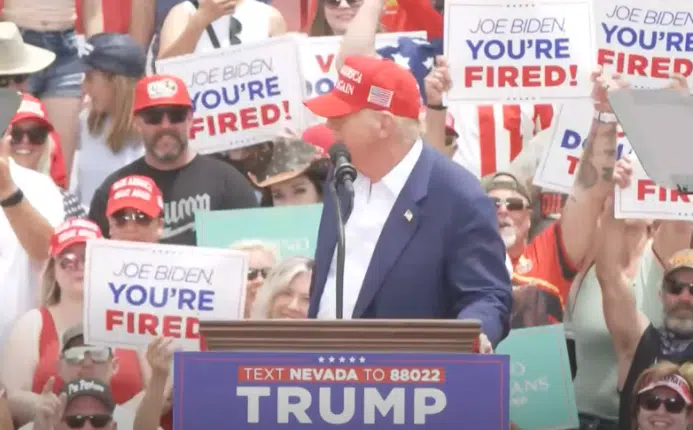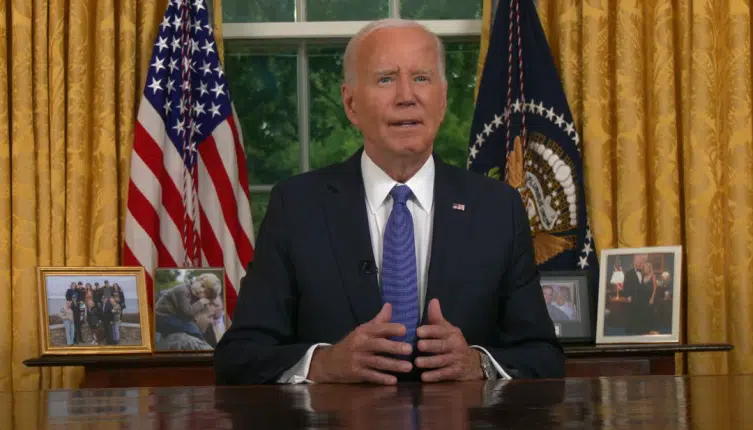The U.S. Justice Department appears poised to indict former President Donald Trump over documents he says he declassified before he left office, with possible allegations of Espionage Act and obstruction of justice charges pending according to U.S. news outlets.
The news comes as former President Trump has been leading President Joe Biden in national polls of the imminent 2024 presidential election. The latest RealClearPolitics.com average of the head-to-head matchup between Trump and Biden has Trump leading 45.5 percent to 43.7 percent, and it’s not even 2024 yet.
Trump is also easily leading the pack in the Republican nomination, averaging almost a 31-point lead over his closest challenger, Florida Republican Gov. Ron DeSantis, including in early states like Iowa and New Hampshire.
The indictment therefore cannot be separated from the political ramifications that are likely to ensue from the optics of the sitting President and his administration taking down his top opponent in the presidential election.
On Truth Social, Trump issued a statement on June 7, calling the imminent federal case “election interference” on a scale never seen. He’s not wrong.
Trump stated, “Wow, this is turning out to be the greatest & most vicious instance of ELECTION INTERFERENCE in the history of our Country. Remember, I’m leading DeSanctimonious BIG in the Polls but, more importantly, I’m leading Biden by a lot. Also, & perhaps most importantly, they are launching all of the many Fake Investigations against me RIGHT SMACK IN THE MIDDLE OF MY CAMPAIGN, something which is unheard of & not supposed to happen. DOJ, FBI, NEW YORK A.G., NEW YORK D.A., ATLANTA D.A. FASCISTS ALL!”
And it might not even be that strong of a case.
The day before he left office, former President Trump declassified a trove of documents related to the Justice Department’s botched investigation of Trump that falsely accused him and his 2016 presidential campaign of being Russian agents.
In the memorandum, entitled, “Memorandum on Declassification of Certain Materials Related to the FBI’s Crossfire Hurricane Investigation,” Trump outlined how the materials were presented to him to be declassified: “At my request, on December 30, 2020, the Department of Justice provided the White House with a binder of materials related to the Federal Bureau of Investigation’s Crossfire Hurricane investigation. Portions of the documents in the binder have remained classified and have not been released to the Congress or the public. I requested the documents so that a declassification review could be performed and so I could determine to what extent materials in the binder should be released in unclassified form. I determined that the materials in that binder should be declassified to the maximum extent possible.”
But not before the FBI complained about the need for redactions, with Trump granting the redactions: “In response, and as part of the iterative process of the declassification review, under a cover letter dated January 17, 2021, the Federal Bureau of Investigation noted its continuing objection to any further declassification of the materials in the binder and also, on the basis of a review that included Intelligence Community equities, identified the passages that it believed it was most crucial to keep from public disclosure. I have determined to accept the redactions proposed for continued classification by the FBI in that January 17 submission.”
The Trump memorandum continued, “I hereby declassify the remaining materials in the binder. This is my final determination under the declassification review and I have directed the Attorney General to implement the redactions proposed in the FBI’s January 17 submission and return to the White House an appropriately redacted copy.”
That redacted copy was never returned to the White House as ordered. In May, former Trump administration official Kash Patel said he witnessed the declassification himself in a phone interview with Breitbart.com, but that the documents remained unaltered and had retained their classified markings: “The White House counsel failed to generate the paperwork to change the classification markings, but that doesn’t mean the information wasn’t declassified. I was there with President Trump when he said ‘We are declassifying this information.’”
Apparently, the Justice Department simply refused to comply with the declassification order, even with the redactions accepted by Trump, and so Trump was left with a decision. Leave it to Biden, or declassify everything and take them with him. Here, Patel appears to be saying that Trump simply decided to declassify the documents in toto and take his chances.
And the Biden Administration Justice Department led by Attorney General Merrick Garland never complied with the Trump memorandum either, Senate Judiciary Committee Ranking Member Chuck Grassley (R-Iowa) and Sen. Ron Johnson (R-Wis.) revealed in a Feb. 15, 2022 letter to Garland. It was a follow-up to an Oct. 2021 letter on the same complaining about the lack of disclosure.
These appear to be the same documents the FBI raided from Trump’s residence in Palm Beach, Fla., Mar-a-Lago, on Aug. 8, 2022. On Truth Social, on Aug. 12, 2022, Trump noted that “it was all declassified,” referring to the documents seized.
The President’s inherent powers to declassify military and other national security information derives from the Constitution’s Article II, Section 1 vesting clause: “The executive power shall be vested in a President of the United States.”
In 1988, in Department of Navy v. Egan, the U.S. Supreme Court outlined the contours of the President’s primary responsibility for classification of sensitive national security documents as deriving directly from Article II, not from any Congressional statute: “The President, after all, is the ‘Commander in Chief of the Army and Navy of the United States.’ U.S. Const., Art. II, 2. His authority to classify and control access to information bearing on national security and to determine whether an individual is sufficiently trustworthy to occupy a position in the Executive Branch that will give that person access to such information flows primarily from this constitutional investment of power in the President and exists quite apart from any explicit congressional grant.”
The years-long, top secret investigation began in July 2016 following false allegations by Clinton campaign operatives that Trump had somehow supported a Russian plan to hack the Democratic National Committee (DNC) email server and post them on Wikileaks, and then was carried over into the Trump administration in 2017, leading to the recusal of former Attorney General Jeff Sessions, the firing of former FBI Director James Comey and the appointment of former Special Counsel Robert Mueller, who found no such conspiracy.
The Mueller report ultimately stated, “[T]he investigation did not establish that members of the Trump Campaign conspired or coordinated with the Russian government in its election interference activities,” and “the evidence does not establish that the President was involved in an underlying crime related to Russian election interference.”
The problems with the Justice Department investigation were further outlined by Special Counsel John Durham in his devastating report outlining the Justice Department, State Department, intelligence agencies and FBI’s “confirmation bias” that led to the investigation of Trump’s 2016 presidential campaign, transition and then administration falsely alleging that Trump and his campaign were Russian agents who had helped Moscow hack the Democratic National Committee (DNC) and put their emails onto Wikileaks despite the fact that the FBI could not “corroborate a single substantive allegation in the [Christopher] Steele dossier reporting,” which was sourced to the Hillary Clinton campaign and the DNC.
During the course of the investigation, the Justice Department obtained surveillance against the Trump campaign and the GOP, first by targeting campaign foreign policy advisor George Papadopoulos via foreign agency efforts beginning in mid-2016, and then with Foreign Intelligence Surveillance Act (FISA) warrant applications on campaign foreign policy advisor Carter Page beginning in Oct. 2016, fueled by the DNC-Steele dossier falsely accusing President Donald Trump, Page and Paul Manafort of being Russian agents, that was renewed after the election and then finally the fateful strike on former National Security Advisor Michael Flynn in Jan. 2017, spying on his Dec. 2016 phone call with the Russian ambassador where Flynn attempted to deescalate tensions with Moscow, leaking it to the Washington Post on Jan. 12, 2017, sending the FBI to ask about it on Jan. 24, 2017 — all encompassing the bedrock of a three-year-long Justice Department investigation, undertaken under the mistaken belief that the nation had just elected a Manchurian Candidate, and risking nuclear war as matters continue to escalate in Ukraine following Russia’s invasion there.
And now it’s all coming to a head on the eve of the 2024 election. After 2020, former President Trump decided that he was not going to leave office lightly. He was going to take the truth with him. And as Kash Patel noted in the Breitbart.com interview, “he thought the American public should have the right to read [it] themselves.”
Instead, President Biden has apparently decided to reclassify those documents and continue to hide the truth from the American people, using the same Article II authority former President Trump used to declassify them in the first place.
The real question that might be asked is “What is Biden hiding?” We might find out soon, but ultimately, it will be for the American people to decide it this is all worth overturning the nation’s two-party system to prop up a failing president who appears to dread a head-to-head matchup with his former rival, and instead seeks to imprison him. This is dangerous, but politically, as the polls indicate, it could be benefitting Trump in unanticipated ways, predictable to see outside the Beltway, but less so for an entrenched political establishment and permanent state too blinded by their own power — and their desperation to keep it.
Robert Romano is the Vice President of Public Policy at Americans for Limited Government Foundation.







